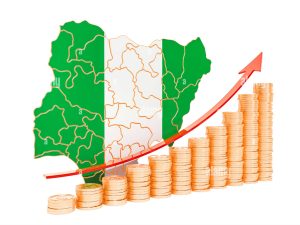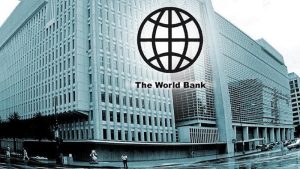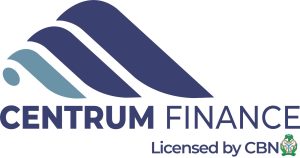CONTENTS
-
ECONOMIC TRENDS
-
IMF OUTLOOK
-
PETROLEUM & ENERGY WATCH
-
DOMESTIC DEBT UPDATE
-
WORLD BANK REPORT
ECONOMIC TRENDS

Nigeria’s Economy Gains Momentum as Inflation Eases
Nigeria’s economy continued showing renewed signs of stability in October 2025, supported by easing inflation and a gradual recovery across key sectors.
According to data from the National Bureau of Statistics (NBS), headline inflation slowed to 18.02% in September, marking its lowest level in more than three years. This moderation, largely driven by improved food supply and ongoing harvests, saw food inflation drop from 21.87% to 16.87% within a month, offering long-awaited relief to households after years of steep price increases.
Analysts attribute this easing to a combination of factors: the strengthening of the naira, improved agricultural output, and tighter monetary policies by the Central Bank of Nigeria (CBN). The government’s ongoing reforms, including fuel subsidy removal and exchange-rate unification, though initially painful, are now beginning to yield visible benefits.
Reflecting this improving outlook, the CBN made its first interest rate cut since 2020, a signal that policymakers are ready to pivot toward growth-supportive measures after several years of tightening. CBN Governor Olayemi Cardoso reiterated the Bank’s commitment to achieving single-digit inflation and promoting credit expansion, particularly for sectors such as manufacturing and agriculture that have strong multiplier effects.
Economists, however, remain cautiously optimistic. They warn that while macro indicators are improving, consumer spending remains weak, unemployment is still high, and energy costs continue to affect small businesses. Structural bottlenecks, from poor logistics to power supply, mean that the road to full recovery will likely be gradual rather than immediate.
Still, the message is clear: Nigeria’s economy is stabilizing, and the data is beginning to reflect the early fruits of reform.
IMF OUTLOOK

Nigeria’s Reforms Praised, Debt Pressures Remain
At the IMF-World Bank Annual Meetings in Washington D.C., Nigeria’s economic reform program received strong commendation for stabilizing the macroeconomic landscape and restoring investor confidence.
The IMF upgraded Nigeria’s 2025 growth forecast to 3.9%, citing improved fiscal management, rising oil production, and steadier exchange-rate policies. It described Nigeria’s structural reforms, including subsidy removal, FX unification, and fiscal tightening, as “painful but necessary corrections” that have improved competitiveness and transparency.
According to the Fund, inflation, which had exceeded 30% in late 2024, has now declined for six consecutive months, while the naira has steadied and foreign reserves surpassed $43 billion. Investor sentiment is gradually improving, with stronger participation in the capital and bond markets.
However, the IMF also highlighted Nigeria’s growing debt service burden, noting that it continues to crowd out investments in critical areas such as education, healthcare, and infrastructure.
The Fund urged the government to expand its tax base, improve digital tax collection, and strengthen public-sector accountability to ensure long-term sustainability. CBN Governor Olayemi Cardoso described the reform journey as “a marathon, not a sprint,” emphasizing that the goal is not just macroeconomic balance but real, visible improvement in the lives of citizens.
Minister of State for Finance, Dr. Doris Uzoka-Anite, added that fiscal reforms are being aligned with social priorities to ensure every Nigerian feels the impact of recovery through better jobs, productivity, and opportunities.
PETROLEUM & ENERGY WATCH

Nigeria Charts a New Strategic Direction for Oil and Gas
In a major policy move, the Federal Government inaugurated a High-Level Committee on Petroleum Sector Strategy (2025–2030) in late October, aiming to redefine Nigeria’s oil and gas industry for long-term sustainability and transparency.
The committee’s five-year roadmap focuses on four strategic objectives:
- Stabilizing crude oil output and boosting domestic refining to reduce import dependence.
- Expanding gas monetization for power generation and industrial use.
- Modernizing midstream infrastructure to reduce losses and inefficiencies.
- Deepening digital governance across agencies such as NNPCL, NUPRC, and NMDPRA.
Though oil and gas now contribute only 6.4% of GDP, they remain the backbone of Nigeria’s exports (85%) and nearly half of government revenue. Persistent challenges such as pipeline vandalism, oil theft, and the global energy transition continue to weigh on performance.
The committee’s task is to translate policy into measurable outcomes, encouraging new investments, promoting renewable energy adoption, and ensuring the PIA’s goals of transparency and accountability are realized.
Minister of State for Petroleum Resources (Oil), Heineken Lokpobiri, reaffirmed that Nigeria’s petroleum future must balance energy security, economic diversification, and climate responsibility.
DOMESTIC DEBT UPDATE

FG Borrows ₦6.17 Trillion in Six Months to Finance Budget Deficit
Nigeria’s Federal Government borrowed a total of ₦6.17 trillion from the domestic debt market within the first half of 2025, according to data from the Debt Management Office (DMO).
The funds were primarily sourced through Federal Government Bonds (FGN Bonds), Nigerian Treasury Bills (NTBs), and Promissory Notes (P-Notes), instruments that make up the country’s growing domestic debt portfolio.
Borrowing Breakdown
- ₦4.48 trillion was raised in Q1 2025
- ₦1.70 trillion was raised in Q2 2025, a 2.26% increase from the previous quarter
This brought Nigeria’s total domestic debt stock to ₦76.59 trillion as of June 30, 2025, up from ₦74.89 trillion recorded at the end of March.
With oil production still below the 1.8 million barrels per day benchmark and non-oil revenues lagging, the Federal Government has relied heavily on domestic borrowing to sustain public spending and meet its budgetary commitments.
According to the Medium-Term Expenditure Framework (MTEF), the government aims to raise over ₦13 trillion domestically in 2025, a target that may be surpassed if borrowing continues at the current pace.
Fiscal Strain Meets Market Confidence
Analysts note that the rising debt profile reflects fiscal strain but also investor confidence in Nigeria’s sovereign instruments.
According to Cordros Capital, total public debt increased 2% quarter-on-quarter, reaching ₦152.4 trillion in Q2 2025 from ₦149.39 trillion in Q1.
- Domestic debt: 52.9% of total
- External debt: 47.1% (USD 46.98 billion equivalent)
External debt rose 1.7% q/q to ₦71.85 trillion, partly due to fresh disbursements from the World Bank ($1.15 billion) and African Development Bank ($12.14 million).
On a year-on-year basis, total debt surged by 113.5%, largely due to naira depreciation and increased domestic issuances.
Despite the high borrowing levels, continued investor participation in government securities, even amid elevated yields and inflation, signals market confidence in Nigeria’s fiscal resilience.
Debt Sustainability and Policy Implications
While domestic borrowing helps Nigeria reduce foreign exposure, it has renewed concerns about fiscal sustainability and the rising cost of debt servicing, which already consumes a significant share of government revenue.
Key observations include:
- Total public debt is projected to hit ₦152.11 trillion by year-end, representing 35.5% of GDP.
- Rising bond yields (now between 18–21%) mean higher servicing costs.
- Persistent fiscal imbalance, with recurrent expenditure far outweighing revenue, continues to strain government finances.
- Continued borrowing risks crowding out private sector credit, slowing economic recovery.
Still, domestic borrowing provides a stable funding mechanism insulated from foreign exchange volatility. Recent issuances like Sukuk and Green Bonds align with the government’s push for ethical and sustainable investments.
Balancing Borrowing with Reform
Preliminary data suggest that total domestic borrowing could reach ₦9 trillion by year-end if the current trend continues.
Experts stress that transparency and productive use of borrowed funds will determine the long-term impact of this debt accumulation.
“Borrowing itself isn’t the problem,” said Charles Fakrogha, MD/CEO of Maxfund Africa Limited.
“What matters is how effectively the funds are deployed. If used for infrastructure and productive projects, it can stimulate growth, create jobs, and enhance future revenue generation.”
He added that while Nigeria’s fiscal challenges persist, ongoing reforms and infrastructure investments could yield positive medium-term growth if managed prudently.
WORLD BANK REPORT

Reforms Commended, Human Impact Urged
In its October 2025 Nigeria Development Update (NDU), titled “From Policy to People: Bringing the Reform Gains Home,” the World Bank commended Nigeria’s reform progress but urged the government to ensure that the benefits are felt by ordinary citizens.
The report highlighted that GDP grew by 3.9% in the first half of 2025, up from 3.5% in 2024, supported mainly by non-oil growth, particularly in services, technology, and agriculture. Foreign reserves climbed to $42 billion, and the public debt-to-GDP ratio dropped to 39.8%, marking Nigeria’s first decline in debt ratio in a decade.
According to the Bank, these improvements are proof that policy consistency and reform discipline are paying off. Yet, despite the macroeconomic progress, the human cost of adjustment remains high. Food prices, for example, are still nearly five times higher than in 2019, placing enormous strain on household budgets.
To consolidate reform gains and ensure inclusiveness, the World Bank identified three key priorities for Nigeria:
- Tackle food inflation sustainably through better logistics, power supply, and storage infrastructure to minimize post-harvest losses.
- Enhance fiscal transparency and efficiency to ensure public funds are properly allocated and utilized.
- Expand social protection and safety nets, cushioning low-income families from shocks caused by inflation and subsidy removal.
The report concluded on a cautiously optimistic note, predicting that with continued reform commitment, Nigeria could achieve broad-based, inclusive growth by 2027.
CENTRUM FINANCE INSIGHT

Turning National Progress into Personal Growth
October closed with a cautious sense of optimism, inflation is cooling, reforms are taking shape, and investor confidence is returning. But one important question remains:
How do these national developments affect your personal finances?
At Centrum Finance, we believe the link between economic progress and personal prosperity begins with intentional financial planning. As policies shift and opportunities open, our goal is to help you position your finances to benefit from Nigeria’s next growth phase.
Whether you’re saving toward your child’s education through EduMax, growing your investment portfolio with ThriftWise, or exploring Mudarabah profit-sharing, we offer tools designed to help you make every naira work smarter.
Economic growth starts with individual empowerment, and every wise financial decision you make today shapes the stronger, more resilient Nigeria we’re all building tomorrow.
Centrum Finance, Your Growth Partner.
Let’s build the future, together.
SOURCES: Nariametrics, Businessday, istock images, Punch newspaper, ICIR Nigeria, Premium Times, Leadership News, Vanguard News, Daily Times Nigeria, Linda Ikeji’s Blog.
DISCLAIMER
This publication is produced by Centrum Finance Company Limited solely for the information of users who are expected to make their own investment decisions without undue reliance on any information or opinions contained herein. The opinions contained in the report should not be interpreted as an offer to sell, or a solicitation of any offer to buy any investment. Whilst every care has been taken in preparing this document, no responsibility or liability is accepted by any member of the Company for actions taken because of the information provided in this publication

